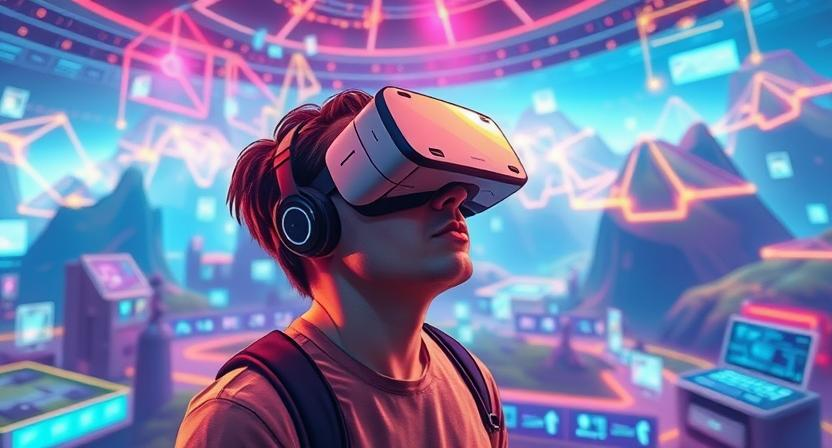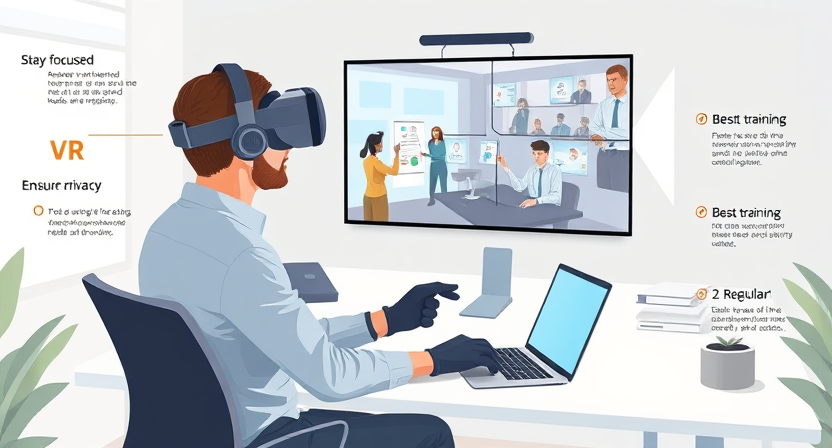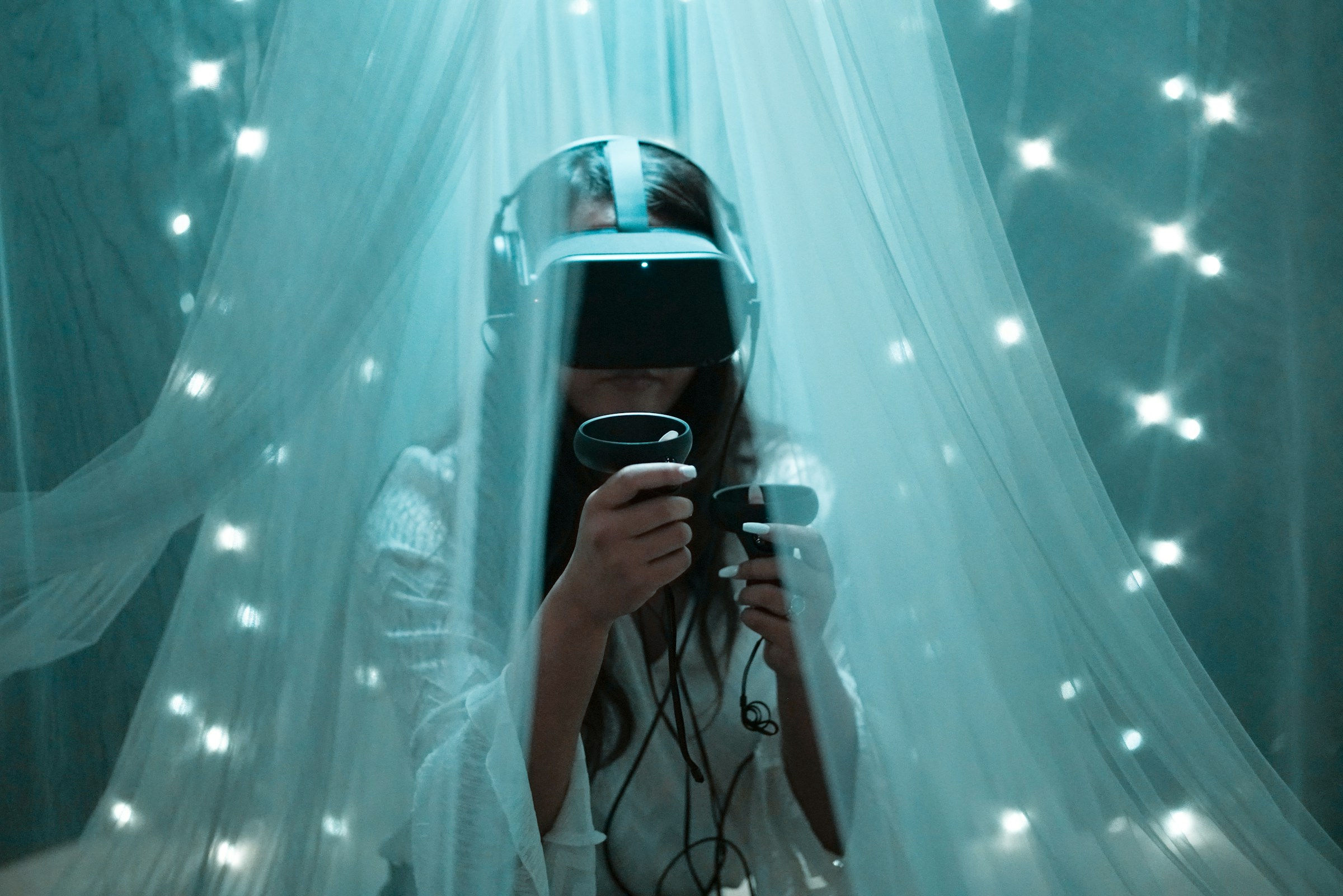AI’s Impact on Virtual Reality Experiences

Artificial Intelligence (AI) is revolutionizing virtual reality experiences by offering unprecedented levels of immersion and interactivity. Through AI-powered algorithms, VR environments can adapt in real-time to user inputs, creating dynamic and personalized experiences that keep users engaged. By analyzing user behavior and preferences, AI can tailor virtual reality content to individual users, enhancing the overall quality of their interactions within the virtual world.
Moreover, AI plays a crucial role in optimizing performance in virtual reality environments. By leveraging machine learning and predictive analytics, AI can anticipate and rectify potential issues before they impact the user experience, ensuring smooth and uninterrupted VR interactions. As AI continues to advance, we can expect even greater synergies between artificial intelligence and virtual reality, paving the way for truly transformative and immersive experiences in the future.
Understanding Artificial Intelligence in VR
Artificial intelligence (AI) plays a pivotal role in shaping the virtual reality (VR) landscape, offering a new realm of possibilities and immersive experiences for users. By integrating AI technologies into VR environments, developers can enhance realism, interactivity, and personalization, ultimately elevating the overall user experience. AI algorithms enable VR systems to adapt to user behavior, preferences, and input, creating dynamic and responsive virtual worlds that feel more natural and engaging.
From creating realistic simulations to improving user interactions, the synergy between AI and VR technologies opens up exciting avenues for innovation and advancement in the digital realm. AI-driven innovations in VR not only streamline processes and optimize performance but also pave the way for personalized and captivating experiences that cater to individual preferences and needs. As AI continues to evolve and expand its capabilities, the future of VR holds boundless opportunities for creating compelling and unforgettable virtual adventures.
The Intersection of AI and Virtual Reality
Artificial Intelligence (AI) and Virtual Reality (VR) are two groundbreaking technologies that have begun to intersect in transformative ways. AI’s dynamic capabilities like pattern recognition, intelligent decision-making, and natural language processing are enhancing the immersive qualities of VR experiences. By incorporating AI algorithms into VR environments, developers can create more interactive and responsive virtual worlds that adapt to user behavior in real-time.
Moreover, AI’s ability to generate personalized content based on user preferences and behavior is revolutionizing the way VR experiences are tailored to individual needs. This level of customization not only increases user engagement but also opens up new possibilities for creating truly immersive and unforgettable virtual experiences. As AI continues to evolve, its collaboration with VR is poised to redefine the boundaries of what is possible in the realm of digital simulations and interactions.
Enhancing Virtual Reality with Artificial Intelligence
Artificial Intelligence (AI) has significantly enhanced the immersive experiences offered by virtual reality (VR) technologies. AI algorithms are able to analyze user behaviors and preferences, enabling VR environments to adapt and personalize content in real time. This level of customization creates a more engaging and interactive experience for users, leading to a deeper sense of immersion in the virtual world. Additionally, AI-powered enhancements in VR can optimize performance by predicting movements and interactions, resulting in smoother and more realistic simulations.
Moreover, AI-driven innovations have also been instrumental in addressing challenges related to VR environments. Through machine learning and data analysis, AI can improve the accuracy of gesture recognition and spatial tracking in VR, providing users with a more intuitive and seamless interaction with the virtual world. By leveraging AI technologies, VR developers can push the boundaries of what is possible in creating dynamic and engaging virtual experiences for users.
AI’s Role in Immersive VR Experiences
Artificial Intelligence plays a pivotal role in enhancing immersive Virtual Reality (VR) experiences. By leveraging AI algorithms and machine learning, VR environments can be enriched with dynamic elements that adapt to user interactions in real-time. This level of responsiveness creates a more engaging and personalized VR experience for users, making them feel more connected to the virtual world around them.
Moreover, AI-powered solutions can optimize VR simulations by simulating realistic behaviors and interactions within the virtual environment. This results in heightened levels of realism and immersion for users, ultimately increasing the overall quality of the VR experience. As AI technology continues to advance, the potential for creating truly immersive and interactive VR worlds is becoming increasingly promising, opening up new possibilities for virtual experiences across various industries.
AI-Powered Enhancements in Virtual Reality

Virtual reality (VR) technology has been significantly enhanced through the integration of artificial intelligence (AI). AI algorithms play a crucial role in improving VR interactions, making the virtual experiences more immersive and engaging for users. Through the synergy of AI and VR technologies, developers have been able to create realistic simulations that cater to individual preferences and behaviors.
One of the key advantages of AI integration in VR is the personalization it offers to users. By leveraging AI-driven innovations, VR environments can adapt and respond to user inputs in real-time, providing an interactive and dynamic experience. These AI-powered features not only enhance the quality of VR content but also open up new possibilities for maximizing the potential of virtual reality technology.
The Future of Virtual Reality with AI
As virtual reality (VR) technology continues to evolve, the integration of artificial intelligence (AI) is poised to revolutionize the way we experience digital environments. AI algorithms are being harnessed to enhance VR interactions, making them more immersive, interactive, and personalized for users. The synergy between AI and VR technologies opens up a realm of possibilities for creating realistic simulations and engaging content that blur the lines between the physical and digital worlds.
The future of VR with AI holds promises of AI-driven innovations that will push the boundaries of what is currently achievable in virtual reality experiences. By leveraging AI-powered features, VR environments can be tailored to individual preferences, maximizing their potential for entertainment, education, training, and beyond. As AI solutions continue to tackle challenges in VR development, we can anticipate a future where AI plays a pivotal role in shaping the next generation of captivating and transformative VR experiences.
AI Algorithms for Improved VR Interactions
AI algorithms play a crucial role in enhancing virtual reality interactions by providing intelligent solutions that adapt to user behavior and preferences in real time. These algorithms are designed to analyze vast amounts of data to predict user actions, optimize performance, and create more immersive experiences within virtual environments. By leveraging AI, VR interactions can become more personalized and responsive, ultimately leading to a more engaging and dynamic user experience.
The integration of AI algorithms in VR interactions also enables developers to overcome technical challenges and enhance the overall quality of virtual reality content. From improving graphics and sound quality to reducing latency and enhancing user interaction, AI-driven algorithms help to create seamless and realistic simulations that captivate users. As AI continues to advance, the potential for further innovations in virtual reality interactions remains promising, paving the way for new levels of immersion and interactivity in VR experiences.
AI-driven Innovations in Virtual Reality
Artificial Intelligence (AI) has brought forth a wave of innovations in the realm of Virtual Reality (VR), shaping the way users interact and engage with immersive experiences. One notable innovation is the integration of AI algorithms to enhance VR environments and interactions. Through AI-powered solutions, VR simulations can now adapt in real-time to user behavior, providing a more dynamic and personalized experience for each individual.
Moreover, AI-driven innovations have revolutionized how virtual content is created and delivered, catering to the preferences of users with unparalleled accuracy. By leveraging AI technologies, VR experiences can now be customized to suit the unique needs and interests of users, fostering a deeper sense of engagement and immersion. This infusion of AI in VR not only enhances the overall user experience but also opens doors to new possibilities in creating compelling and unforgettable virtual worlds.
The Synergy of AI and Virtual Reality Technologies
Artificial Intelligence (AI) and Virtual Reality (VR) technologies are rapidly converging to create more immersive and interactive experiences for users. AI algorithms are being integrated into VR environments to enhance interactivity, personalization, and realism. Through machine learning and data analysis, AI can adapt virtual scenarios based on user behavior, preferences, and inputs, leading to more engaging and tailored experiences.
Moreover, AI-driven innovations in VR are revolutionizing the way users interact with virtual worlds. From gesture recognition and natural language processing to dynamic object manipulation and intelligent avatars, AI technologies can understand and respond to user actions in real time, blurring the lines between the physical and digital realms. As AI continues to evolve, the synergy between AI and VR is poised to unlock new levels of creativity, immersion, and storytelling in virtual experiences.
AI Applications in Virtual Reality Environments

One of the key AI applications in virtual reality environments is the enhancement of user interactions and experiences. Through advanced algorithms and machine learning techniques, AI can analyze user behavior in real-time, adjusting the virtual environment to better suit individual preferences and needs. This personalized approach not only increases user engagement but also allows for more immersive and tailored virtual reality experiences.
Moreover, AI plays a crucial role in optimizing resource management within virtual reality environments. By utilizing predictive analytics and automation, AI can efficiently allocate computational resources, network bandwidth, and other technical aspects to ensure smooth and seamless VR experiences. This dynamic optimization not only enhances performance but also contributes to the overall scalability and reliability of virtual reality environments.
Artificial Intelligence for Realistic VR Simulations
Artificial intelligence (AI) plays a crucial role in creating realistic virtual reality (VR) simulations by enabling dynamic and responsive environments. AI algorithms are used to simulate realistic behaviors of objects, characters, and elements within the VR space. This results in enhanced immersion for users, as they interact with virtual entities that exhibit intelligent and natural responses.
Moreover, AI helps to optimize the performance of VR simulations by adapting to user actions in real-time. By incorporating machine learning and predictive analytics, AI can anticipate user behavior and adjust the simulation accordingly, ensuring a seamless and engaging experience. This level of responsiveness and adaptability is key to creating truly immersive and realistic VR environments that captivate users and blur the lines between the virtual and real worlds.
The Advantages of AI Integration in Virtual Reality
AI integration in virtual reality brings numerous benefits that enhance user experiences and push the boundaries of what is possible in VR environments. By leveraging artificial intelligence, VR applications can become more intuitive and responsive to user inputs, creating a more immersive and realistic experience. AI algorithms can adapt in real-time to user behaviors, adjusting environments, characters, and interactions to maximize engagement and enjoyment.
Furthermore, AI can significantly improve the level of personalization in virtual reality experiences. By analyzing user preferences, interactions, and physiological responses, AI can tailor the VR environment to fit the individual user’s preferences, creating a more personalized and engaging experience. This level of customization not only increases user satisfaction but also opens up new possibilities for creating unique and memorable virtual reality content that resonates with each user on a deeper level.
AI’s Contribution to Enhanced Virtual Reality Experiences
Artificial Intelligence (AI) has revolutionized the realm of virtual reality (VR) by enhancing the overall user experience. One significant way AI contributes to improved VR experiences is through its ability to personalize content based on user interactions. By analyzing user behavior and preferences in real time, AI algorithms can tailor VR environments to meet individual needs, creating a more immersive and engaging experience for each user.
Moreover, AI plays a crucial role in addressing performance issues in VR systems. AI-powered solutions can optimize graphics rendering, reduce latency, and enhance overall system efficiency, resulting in smoother and more realistic VR simulations. By constantly adapting to user interactions and system requirements, AI helps elevate the quality of VR experiences, making them more compelling and enjoyable for users.
AI Solutions for Virtual Reality Challenges
Virtual reality (VR) technology continues to push the boundaries of immersive experiences, offering users a new way to interact with digital environments. However, as with any emerging technology, VR faces its own set of challenges that can hinder its widespread adoption and full potential realization. From motion sickness to limited interactivity, these hurdles reveal the need for innovative solutions to enhance the VR experience.
Artificial intelligence (AI) emerges as a key player in addressing the challenges faced by VR technology. By leveraging AI algorithms and machine learning capabilities, developers can create more intuitive and responsive virtual environments. One promising application of AI in VR is the development of intelligent avatars that can adapt to users’ behavior and preferences, offering a more personalized and engaging experience. Additionally, AI-powered predictive analytics can anticipate user movements and interactions, leading to smoother and more realistic VR simulations.
Innovative AI Techniques for Virtual Reality Enhancement

AI techniques are continuously evolving to enhance virtual reality experiences, offering users more immersive and realistic environments. One area where AI excels in VR enhancement is through the use of machine learning algorithms to predict user behavior and adjust the virtual world in real-time. By analyzing user interactions and preferences, AI can dynamically adapt the VR content to provide a more personalized and engaging experience.
Furthermore, AI-powered object recognition capabilities play a significant role in enhancing virtual reality by enabling realistic simulations and interactions with virtual environments. Through advanced computer vision algorithms, AI can accurately identify objects within the virtual space and interact with them based on predefined behaviors. This technology not only improves the overall authenticity of VR experiences but also opens up new possibilities for creating interactive and dynamic virtual worlds.
AI-driven Personalization in Virtual Reality
AI-driven personalization in virtual reality (VR) is revolutionizing the way users interact with immersive environments. By leveraging artificial intelligence algorithms, VR experiences can be tailored to an individual’s preferences, behaviors, and interactions within the virtual world. This level of customization enhances user engagement and overall satisfaction with the VR content, creating a more compelling and interactive experience.
Through advanced machine learning techniques, AI can analyze user data in real-time to adapt the VR environment dynamically. This means that each user may have a unique experience based on their actions and choices within the virtual space. From personalized character interactions to customized storylines, AI-driven personalization in VR has the potential to transform passive viewing into active participation, making the virtual world feel more responsive and reflective of the user’s own desires and interests.
Maximizing Virtual Reality Potential with AI
Artificial Intelligence (AI) has become a pivotal component in enhancing the potential of Virtual Reality (VR) experiences. Through the integration of AI algorithms and technologies, VR environments are evolving to offer users a more immersive and engaging journey. AI-driven innovations in VR are enabling real-time data processing, dynamic content generation, and personalized interactions, thus pushing the boundaries of what is achievable within virtual worlds.
The synergy between AI and VR technologies is paving the way for a new era of interactive and realistic simulations. By leveraging AI solutions, VR developers can create more lifelike environments, intelligent characters, and responsive scenarios. This fusion of AI and VR not only amplifies the overall user experience but also opens up endless possibilities for innovative applications across various industries, from gaming and entertainment to education and healthcare.
AI’s Role in Creating Engaging VR Content
Artificial Intelligence plays a crucial role in the creation of engaging virtual reality content. Through sophisticated algorithms and machine learning capabilities, AI can analyze user behavior and preferences to tailor VR experiences accordingly. This level of personalization enhances user engagement and immersion, making the virtual environment more captivating and enjoyable.
Furthermore, AI can optimize the creation process by automating certain tasks such as environment design, object placement, and character animation. By streamlining these processes, developers can focus more on the creative aspects of content creation, leading to high-quality, engaging virtual reality experiences for users. Ultimately, AI’s contribution to creating engaging VR content is pivotal in pushing the boundaries of what can be achieved in the realm of virtual reality entertainment and experiences.
AI-powered Features for Enhanced Virtual Reality Experiences
In virtual reality (VR) experiences, the integration of artificial intelligence (AI) has unlocked a realm of possibilities for enhancing user immersion and interaction. AI-powered features in VR can dynamically adapt environments based on user behavior, creating personalized and engaging scenarios. Through machine learning algorithms, AI can analyze user inputs and actions in real-time, allowing for more responsive and interactive virtual environments that evolve with the user’s preferences and behaviors.
Moreover, AI-driven features in VR can enable more realistic simulations by generating intelligent NPCs (non-player characters) that exhibit complex and varied behaviors. These AI-driven NPCs can enhance the overall VR experience by providing users with more dynamic and lifelike interactions within the virtual world. Additionally, AI algorithms can optimize resource allocation and performance in VR applications, ensuring smoother gameplay and seamless transitions between different virtual environments. Integrating AI into VR not only enhances user engagement but also opens up new possibilities for creating truly immersive and captivating virtual experiences.




